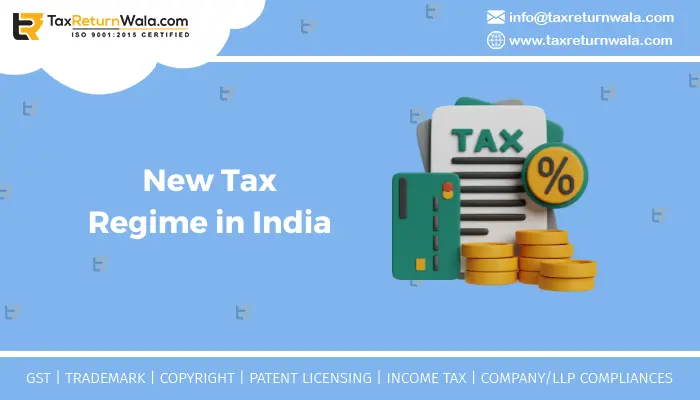New Tax Regime in India – A Comprehensive Guide (Updated for 2024-25)
The Indian tax system offers taxpayers the option to choose between the old and new tax regimes. Introduced in the 2020-21 budget, the new regime offers lower tax rates but comes with limitations on deductions and exemptions. This blog post by Tax Return Wala clarifies the recent changes in income tax slabs and regulations, specifically focusing on the new tax regime.
Benefits of the New Tax Regime
- Lower Tax Rates: The new regime boasts lower tax rates compared to the old regime. This can significantly reduce your tax burden, especially for those in lower income brackets.
- Increased Tax Exemption Limit: The basic exemption limit has been raised from Rs. 2.5 lakhs to Rs. 3 lakhs, offering immediate tax relief.
- Tax Rebate: The new regime introduces a tax rebate for income up to Rs. 7 lakhs. This translates to no tax liability for individuals falling under this threshold.
- Standard Deduction: The new regime includes a standard deduction of Rs. 50,000, simplifying tax calculations and potentially reducing taxable income.
- Reduced Highest Surcharge Rate: Taxpayers with an annual income exceeding Rs. 5 crore benefit from a reduced highest surcharge rate, lowering their overall tax liability.
What You Can’t Claim Under the New Regime
While offering lower tax rates, the new regime comes with limitations on deductions and exemptions. Here’s what you cannot claim under the new system:
- Chapter VI-A Deductions (Except for Specific Sections): Popular deductions like those under sections 80C (investments), 80D (medical expenses), and 80E (education loan) are not allowed, except for contributions made to notified pension schemes under section 80CCD(2) and employment for new recruits under section 80JJAA.
- Other Deductions and Exemptions: Several deductions related to allowances, perquisites, and depreciation are also unavailable. This includes deductions for LTA, HRA, entertainment allowance, professional tax, interest on housing loan for self-occupied property, and business-related deductions like additional depreciation and investment allowance.
House Property and Business Income Under the New Regime
- Self-Occupied Property: The new regime eliminates the deduction for interest paid on housing loans for self-occupied properties. Additionally, losses incurred from such properties cannot be set off against your income. However, interest paid on loans for rented properties remains deductible, with a limit on the taxable rent received.
- Business Income: Deductions and exemptions are not allowed against business income under the new regime. This includes additional depreciation, investment allowance, sector-specific deductions, and expenditure on scientific research. Brought forward business losses or unabsorbed depreciation cannot be carried forward or set off either.
Choosing Between the Old and New Regimes
The decision to opt for the new regime depends on your individual circumstances. Consider these factors:
- Income Level: The lower tax rates in the new regime might benefit those in lower income brackets more significantly.
- Investment Plans: If you rely heavily on deductions under sections like 80C for tax planning, the old regime might be more suitable.
- Deductible Expenses: If you have significant deductible expenses related to housing loans, allowances, or business operations, the old regime might offer a lower tax liability.
Tax Return Wala: Your Partner in Tax Management
Navigating the complexities of the new tax regime can be challenging. Tax Return Wala offers expert guidance and comprehensive services to help you make informed tax decisions. We can assist with:
- Evaluate the benefits of each regime based on your financial situation.
- Calculating your tax liability under both regimes.
- Maximizing deductions and exemptions under the old regime (if applicable).
- Streamlining the tax filing process.
Understanding the recent changes in income tax slabs and the nuances of the new tax regime is crucial for making informed tax decisions. While the new regime offers lower tax rates, the limitations on deductions and exemptions must be carefully considered. Tax Return Wala’s team of tax professionals is here to help you navigate the tax landscape and ensure you file your taxes accurately and efficiently. Contact us today for a free consultation and let us simplify your tax filing experience.
Need tax help?
We are just an email away info@taxreturnwala.com


